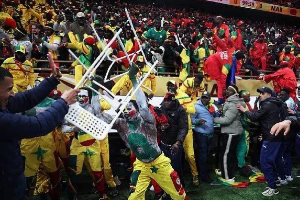Accra, June 12, GNA - Alhaji Saddique Boniface, Minister of Manpower, Youth and Employment, on Monday placed parental indiscipline and neglect at the core of child labour in Ghana and called for collaborative efforts for the survival of the Ghanaian child. He observed that child labour had negative political, social and economic repercussions and blamed the society for the perpetuation of the child labour phenomenon.
Alhaji Boniface made the observation in Accra on the occasion of the Fifth World Day against Child Labour and the launch of the International Labour Organisation (ILO) second Global Report in Ghana. The day, held on the theme: "The End of Child Labour: Within Reach", is to bring hope to all who are committed to winning the fight against child labour.
The ILO Global Report, re-launched earlier in May 2006, indicated an 11 per cent decrease in child labour over the last four years with the sharpest decline in the area of hazardous work. It showed that for age group of 5years to 14 years, the decline in hazardous work was 33 per cent. However, it noted that regrettably least progress had been recorded in Sub-Saharan Africa, where the rate of population growth, HIV/AIDS infection and child labour remained alarmingly high.
The worst forms of child labour include child domestic work; fishing; child porters; commercial sexual exploitation; customary or ritual servitude; small- scale mining and quarrying and commercial agriculture. In the urban informal economy, child labourers are found in the transport, traditional restaurants, begging and petty trading.
Alhaji Boniface criticised the use of house-helps at the expense of their education and impressed upon parents that their responsibility was to take good care of their children.
He urged parents to guarantee that their children would not be left at the mercy of nature and providence even in the event of death. "He who brings forth a child and does not make it grow happily is accursed," Alhaji Boniface said, adding that a man had to make sure that his children were better placed in life than himself.
He said God was observing the inhuman treatment of children in the fishing communities in Yeji in the northern part of the country, adding that children needed not to be introduced to the monetary world of work, where it became difficult to withdraw them after they had become used to the influence of money.
Alhaji Boniface listed Government interventions to eliminate child labour, which included provisions of the 1992 Constitution, the Children's Act of 1988 and the Criminal Code and said policy documents such as the Street Children Policy, Policy on Commercial Sex Exploitation were being developed to combat child labour.
Mr Kwame Amporfo Twumasi, Deputy Minister of Education, Science and Sports, said child labour affected the academic achievement of a considerable number of children, who combined work and school. He said for the goal of Universal Primary Education to be reached by 2015, Government had stepped up efforts to eliminate child labour. He said Ghana's development framework, the Growth and Poverty Reduction Strategy, in link with other international programmes provided a context for an integrated approach to end the involvement of children in exploitative and hazardous child labour.
Mr Twumasi called for the enforcement of both national and international legislations and conventions to eliminate the canker. Ms Yaa Frimpomaa Yeboah, Chief Technical Advisor to International Labour Organisation=92s (ILO's) International Programme for the Elimination of Child Labour, said the ILO believed that Ghana could achieve the ILO's target of eliminating the worst forms of child labour by 2016 if trends in government activities continued and intensified. She, however, observed that there were great challenges and called for the re-invigoration of the national campaign against child labour. Ms Dorothy Rozga, Resident Representative of United Nations Children's Fund, said according to the 2003 Ghana Child Labour Survey, an estimated 1.2 million children in Ghana were engaged in activities classified as child labour.
Some 240,000 of these Ghanaian children were being exploited in the worst forms of child labour.
Ms Rozga said despite the grim nature of the situation, UNICEF was pleased with national developments in the efforts to combat child labour.
Regional News of Monday, 12 June 2006
Source: GNA












